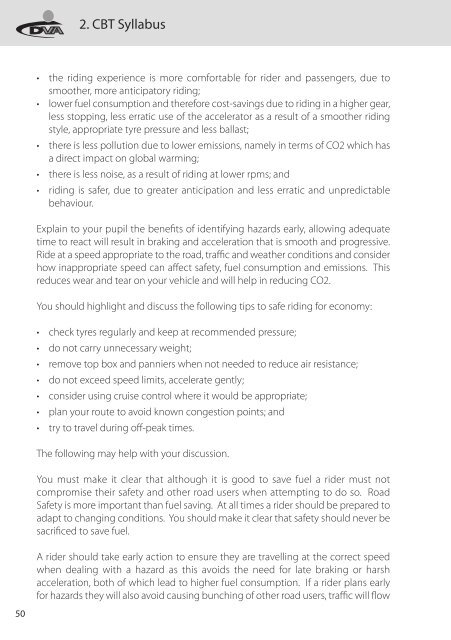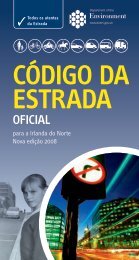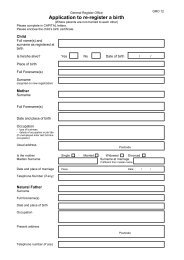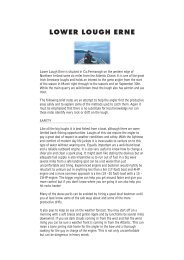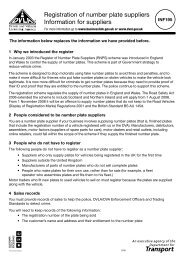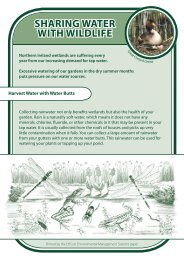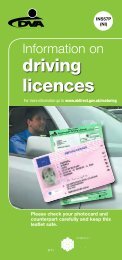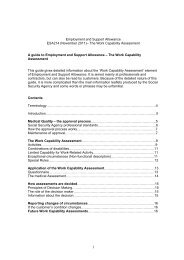an instructors guide to delivering compulsory basic training - NIDirect
an instructors guide to delivering compulsory basic training - NIDirect
an instructors guide to delivering compulsory basic training - NIDirect
You also want an ePaper? Increase the reach of your titles
YUMPU automatically turns print PDFs into web optimized ePapers that Google loves.
50<br />
2. CBT Syllabus<br />
• the riding experience is more comfortable for rider <strong>an</strong>d passengers, due <strong>to</strong><br />
smoother, more <strong>an</strong>ticipa<strong>to</strong>ry riding;<br />
• lower fuel consumption <strong>an</strong>d therefore cost-savings due <strong>to</strong> riding in a higher gear,<br />
less s<strong>to</strong>pping, less erratic use of the accelera<strong>to</strong>r as a result of a smoother riding<br />
style, appropriate tyre pressure <strong>an</strong>d less ballast;<br />
• there is less pollution due <strong>to</strong> lower emissions, namely in terms of CO2 which has<br />
a direct impact on global warming;<br />
• there is less noise, as a result of riding at lower rpms; <strong>an</strong>d<br />
• riding is safer, due <strong>to</strong> greater <strong>an</strong>ticipation <strong>an</strong>d less erratic <strong>an</strong>d unpredictable<br />
behaviour.<br />
Explain <strong>to</strong> your pupil the benefits of identifying hazards early, allowing adequate<br />
time <strong>to</strong> react will result in braking <strong>an</strong>d acceleration that is smooth <strong>an</strong>d progressive.<br />
Ride at a speed appropriate <strong>to</strong> the road, traffic <strong>an</strong>d weather conditions <strong>an</strong>d consider<br />
how inappropriate speed c<strong>an</strong> affect safety, fuel consumption <strong>an</strong>d emissions. This<br />
reduces wear <strong>an</strong>d tear on your vehicle <strong>an</strong>d will help in reducing CO2.<br />
You should highlight <strong>an</strong>d discuss the following tips <strong>to</strong> safe riding for economy:<br />
• check tyres regularly <strong>an</strong>d keep at recommended pressure;<br />
• do not carry unnecessary weight;<br />
• remove <strong>to</strong>p box <strong>an</strong>d p<strong>an</strong>niers when not needed <strong>to</strong> reduce air resist<strong>an</strong>ce;<br />
• do not exceed speed limits, accelerate gently;<br />
• consider using cruise control where it would be appropriate;<br />
• pl<strong>an</strong> your route <strong>to</strong> avoid known congestion points; <strong>an</strong>d<br />
• try <strong>to</strong> travel during off-peak times.<br />
The following may help with your discussion.<br />
You must make it clear that although it is good <strong>to</strong> save fuel a rider must not<br />
compromise their safety <strong>an</strong>d other road users when attempting <strong>to</strong> do so. Road<br />
Safety is more import<strong>an</strong>t th<strong>an</strong> fuel saving. At all times a rider should be prepared <strong>to</strong><br />
adapt <strong>to</strong> ch<strong>an</strong>ging conditions. You should make it clear that safety should never be<br />
sacrificed <strong>to</strong> save fuel.<br />
A rider should take early action <strong>to</strong> ensure they are travelling at the correct speed<br />
when dealing with a hazard as this avoids the need for late braking or harsh<br />
acceleration, both of which lead <strong>to</strong> higher fuel consumption. If a rider pl<strong>an</strong>s early<br />
for hazards they will also avoid causing bunching of other road users, traffic will flow


